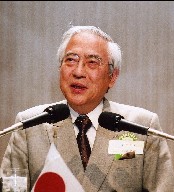��Back Stage of Diplomacy��
July 26, 2006
Mr. Kazuo Ogura,
President of The Japan Foundation
 ��Needless to say, there are many types of back stages to diplomacy. Let me pass on to you some specific examples of communicating messages through non-verbal communication.
��Needless to say, there are many types of back stages to diplomacy. Let me pass on to you some specific examples of communicating messages through non-verbal communication.
��First is gesturing with hand signals and facial expressions.
��In April of 1992, President Yeltsin invited ambassadors of countries and held a conference to ��seek understanding for a referendum.�� President Yeltsin, after discussing Russia��s domestic affairs, touched upon diplomatic issues, and said, ��I will be going to Tokyo for the July Summit, but the Japanese Foreign Minister insists on linking economic cooperation with the territorial issues, which causes me a great quandary.�� At this point, Foreign Minister Kozilev who was standing next to President Yeltsin, looked at the Japanese Ambassador and slightly raised one finger of his right hand. The Japanese Ambassador took this to mean, ��If you want to refute, now is the time,�� and raised his hand to seek an opportunity to make a statement. While the other ambassadors all stood in awe, he went to the podium and gave his refutation.
��Second is an expression of intent by dress. In November 1936, when Mr. Shigemitsu, the Japanese Ambassador to the USSR, presented his credentials to the head of state at the Kremlin, everyone on the Soviet side, being the government after the Revolution, greeted Shigemitsu all wearing ordinary suits. Shigemitsu was told of this in advance. However, Shigemitsu made his appearance in full court dress. According to Shigemitsu��s memoirs, ��This was to show my respect to His Majesty the Emperor,�� but I think that this was Shigemitsu indicating by his dress of his will, ��I will not be made to follow your pace.��
��The third example is entertaining, such as by dining. In September of 1972, the then Vice President of the Liberal Democratic Party, Shiina, visited Taiwan. This was to pay one��s respects prior to the initiation of the normalization of diplomatic relations between Japan and China, but Taiwan, who is known to be very courteous, did not hold even one dinner during the three-day visit. This was clearly their expression of displeasure. It was the sign that the visiting delegation was accepted, but they were not heartily welcomed.
��Fourth is about the significance of wine in diplomacy. On January 6, 1994, at Gand, Normandy, in France, a commemorative dinner for the 50th anniversary of the landing at Normandy was held. All of the materials to prepare the dinner were Normandy-produced. However, the wine was the famous Bordeaux wine��CHATEAU LA MISSION HAUT-BRION, 1945��The year of the vintage was the exact year of the landing. It can be remembered as an example of a political message to remember 1945 imbued into the dinner.
��A similar event also took place in Japan. On September 7, 1990, the wines served at the dinner for Foreign Minister Shevardnadze were red wine from Georgia, in the Soviet Republic, and white wine from Koshu, in Japan. The cuisine was French, but to make the impression of the message that Japan and Russia are not bound only by the European protocols, Japanese and Soviet wines were served.
��The fifth example is cigarettes. During the London Naval Conference in December 1935, the Japanese delegation, who had been advocating an equal ratio, at the press conference at the hotel distributed ��555��, a well-known brand of cigarettes in England. This was an example of Japan sending a clever message to the reporters.
��The most well-known story about a gift took place in Beijing on September 27, 1972. Mao Tse-Tung gave a book titled ��Annotated Collection of Songs of Chu�� to then Prime Minister Tanaka. The content is literature of a poet, Qu Yuan, with annotations. Qu Yuan was also a politician, and in China is regarded as the loyal subject of the beloved country. An event of throwing rice dumplings into the water on May 5 to worship QuYuan has been passed down as folklore.
��There are many theories as to the reasons behind Mao presenting Tanaka with the ��Annotated Collection of Songs of Chu��. Japanese people are probably aware of the story of QuYuan. The seasonal festival in May is celebrated both in Japan and China. My interpretation is that Mao wanted to say that Japan and China share the same tradition and history, so why not get along?